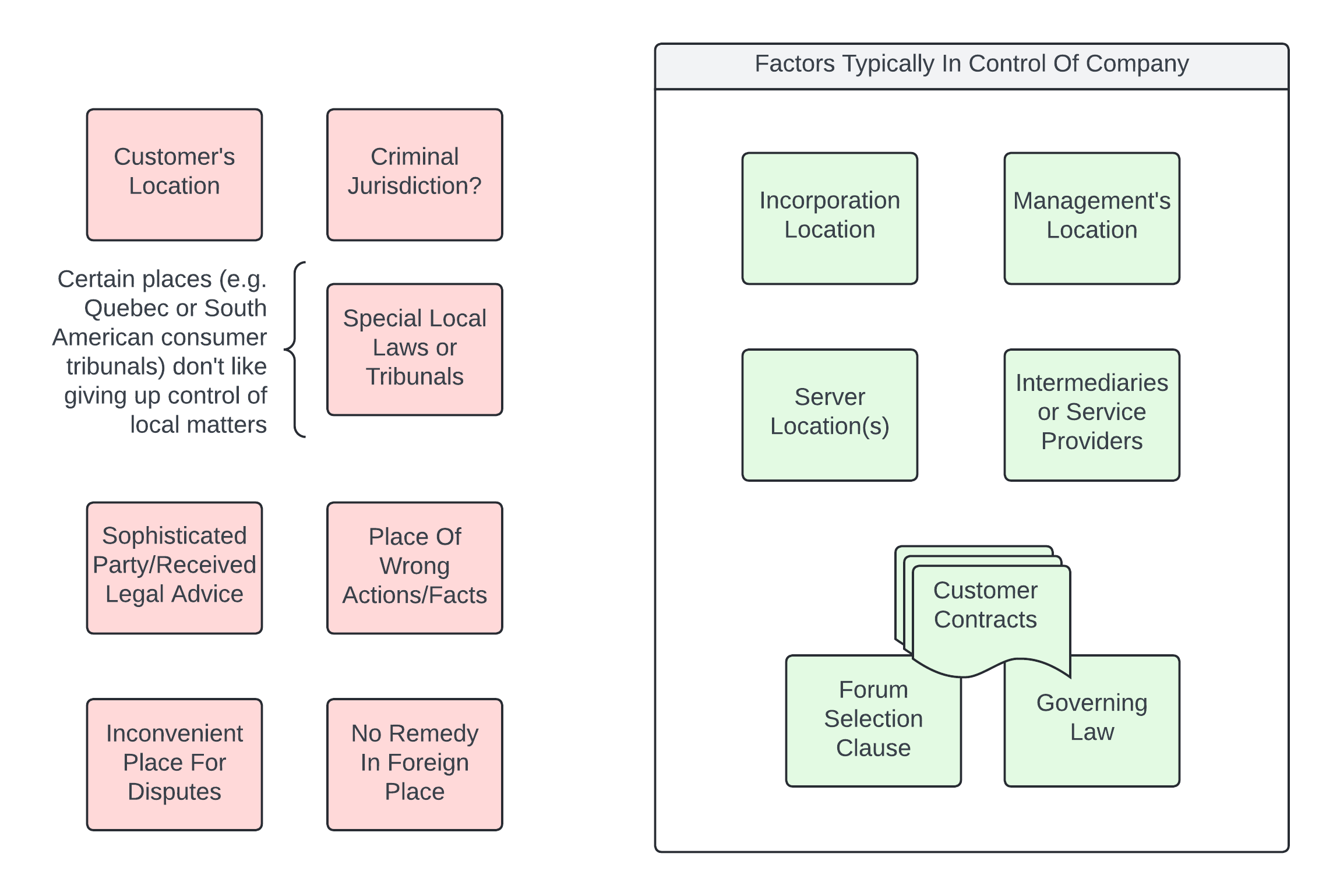
A companion blog post to this explains what goes into where to set up a company. But once a business is set up in a certain places that's not the final word on what laws and countries matter. Businesses need to be careful to try not to have their activities be regulated by places that they don't intend. In order to do that they need to be mindful of their actions, server location(s), who they do business with (along the way to serving their customers), their contracts, and where the people who run their business are located. These are all factors that lawyers can advise on and companies can exert control over. On the other hand, there's a number of factors they have a lot less control over, which might ultimately end up allowing someone to sue or maintain an action in a foreign place.
A company in Ontario would ideally like all of their customers to only sue in Ontario. They know Ontario and they have a good network of lawyers to handle litigation. So they would typically set up their contracts to require Ontario as the place for disputes. And this is effective most of the time. But there's many special laws around the world, and practices of courts, that reject this contractual approach to setting where disputes are allowed. The reason for this is obvious: companies use these clauses to prevent people from getting justice. Courts don't like it when they have to write a decision that says that justice is denied to the people in their place.
Criminal jurisdiction is often particularly long in reach. Don't believe me? Canada even has Criminal Code provisions that address crimes committed on the moon! A place where no crime has ever happened, and where only government employees are likely to ever venture, for the foreseeable future. When crimes on the moon are in scope, crimes all over the world are often in scope too. This subject is too complicated to explain in a quick blog post but basically: not even an escape to the moon is enough to escape the government's claimed jurisdiction when it comes to criminal matters.

With civil matters, there's a principle called comity
that means that countries respect the borders of each other, and leave matters within the borders of other places to the courts of those places. So long as another court is handling it, local courts are often fine to sit back and watch. But if they believe that there's no chance of justice, they may take action, even when other fcators might suggest that they shouldn't.
The key term for the reasons that courts use for asserting jurisdiction is connecting factors
. What are all of the facts that connect something to the court in this place vs. another? How this works in practice varies, and it's often a purpose-driven search, but it's true that the fewer the factors that connect to a place, the less likely that court will take jurisdiction.
One of the most overlooked factors for jurisdiction is the location of the servers that are where the business is actually carried out. In many cases people are using AWS in America as their place for servers. Courts and regulatory agencies take note of this. Similarly, if all of the people behind a business are in Canada but the company is in Panama, there's another factor for connecting to Canada and asserting jurisdiction.
The most important means that companies have of fending off foreign jurisdictions taking a case is their contracts. Many lawyers simply don't know about this topic and fail to include foreign selection clauses in their agreements. Sometimes they think that a governing law clause is enough. But it isn't. And the governing law choice is often pointless because the default rule of courts in many places is to assume that the laws of another place are the same as their own place, unless proven. And the cost of proving the foreign law (or the pointlessness of that exercise if the laws are functionally the same) causes many parties to not bother with that process. So a governing law clause may be deceptive in that it appears to pick a different law than the one that's likely to be applied.
Conflicts of law is a complex subject. But it's one that should never be ignored for cross-border or multinational businesses, as many crypto projects are.
